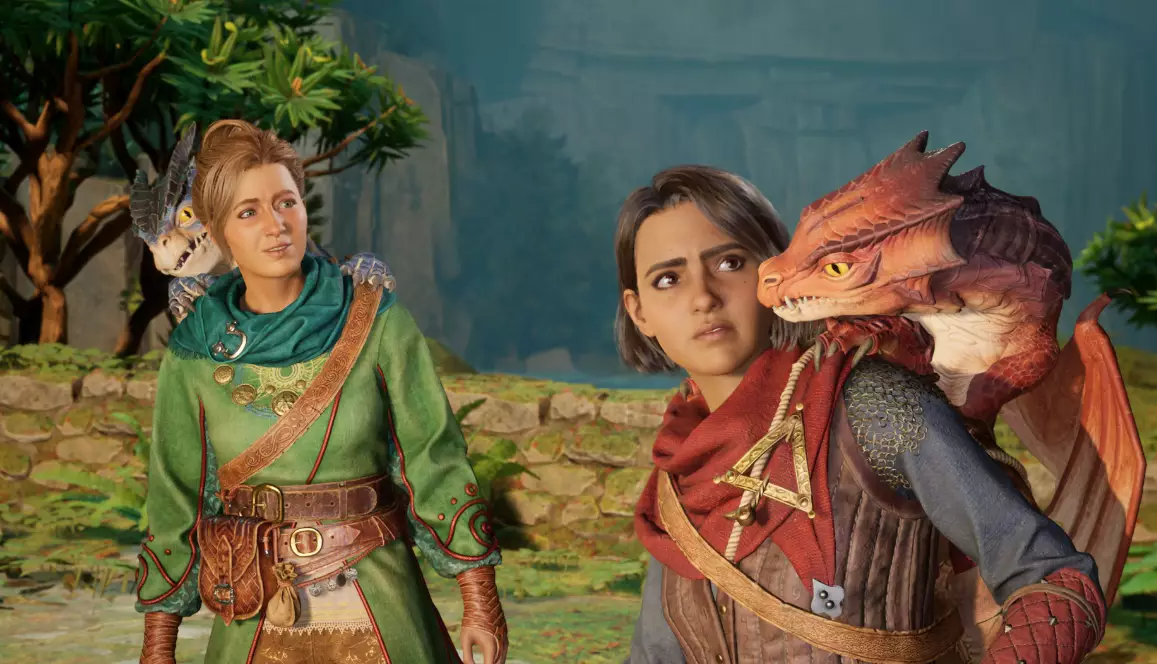Following the overwhelming success of their previous collaborative narrative, “It Takes Two,” which has sold over 20 million copies worldwide, Hazelight Studios is once again ready to capture the hearts and minds of gamers with their new title, “Split Fiction.” Set to launch this March, the game will introduce players to protagonists Mio and Zoe, who find themselves grappling with a thought-provoking dilemma—encountering a machine that appropriates ideas from writers without due compensation. This premise resonates deeply in an era where the rise of AI continues to challenge the very fabric of creative industries.
In a recent interview with VGC, Hazelight’s founder and director, Josef Fares, shared his nuanced views on the integration of artificial intelligence into the gaming landscape. He perceives AI as both an exhilarating development and a source of concern. “It’s both scary and very exciting,” he remarked, emphasizing the necessity for the industry to not resist but rather embrace technological advancements. This perspective is vital as it encourages adaptation in an ever-evolving marketplace, fostering innovation rather than stagnation.
Fares pragmatically acknowledges the fears around job displacement that AI technology might bring. He pointed out that, like any new technology, while there may be immediate job losses, it could eventually stimulate the creation of new roles and opportunities within the industry. His position invites developers to rethink their strategies in working collaboratively with AI rather than viewing it as a formidable competitor.
As the discussion about AI’s place in video games continues to unfold, recent studies indicate that many game developers are already integrating AI tools into their workflows. While concerns about workforce reduction loom large, companies like Electronic Arts have adopted a balanced viewpoint, suggesting that although there might be temporary job losses, overall employment will expand in new directions as the industry evolves. This claim is echoed by Strauss Zelnick, the head of Take-Two, who provocatively described AI as an oxymoron because machines lack true learning capabilities. His assertion underscores the enduring value of human creativity and intuition in the development of video games.
Fares also raised an important point regarding the unpredictable consequences of AI’s permeation into creative spaces, suggesting that it could lead to a dichotomy of outcomes—both beneficial and detrimental. Recognizing the complexity of this issue, he asserts the importance of remaining engaged with the conversation surrounding AI, viewing it as a pivotal element that could potentially reshape the industry.
Moreover, as the gaming community experiences ongoing challenges, such as the current strike by video game performers, AI remains a contentious topic. Prominent voice actor Jennifer Hale has labeled AI as an “existential” threat to the future of performance in video games. This apprehension illustrates the broader ethical implications of AI technology, particularly concerning the rights of creators and performers in an increasingly automated world.
Given Fiona’s outspoken nature, it’s unsurprising that he wouldn’t shy away from discussing AI while acknowledging its sensitive implications. Reflecting on AI’s potential long-term impact, he went so far as to predict that it may eventually eclipse the transformative effects of the internet itself. His comments serve as a call to action for the gaming industry to engage with these technologies thoughtfully, fostering a collaborative environment where human creativity and technological advancement can coexist.
As Hazelight prepares for the release of “Split Fiction,” the conversation around AI continues to be a focal point of interest within the gaming sector. The balance between technological advancement and ethical considerations remains precarious, and the response from developers could determine the trajectory of the industry. It will be fascinating to observe how Hazelight harnesses AI in their upcoming game and what new narratives they develop in the process. Ultimately, the innovation stimulated by AI offers a plethora of possibilities, but it also necessitates careful deliberation to ensure the integrity of human creativity is preserved.

